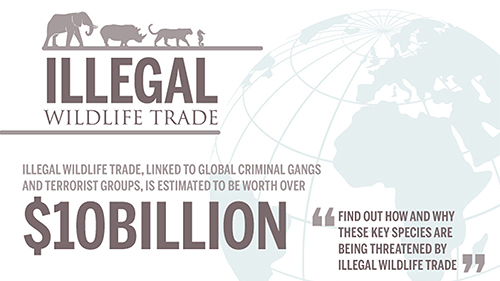Green criminology growing against the illegal wildlife trade
 High rewards and low risks of detection and punishment have made the illegal trade in wildlife attractive to criminals.
High rewards and low risks of detection and punishment have made the illegal trade in wildlife attractive to criminals.
Fri, 29 May 2015 11:18:00 BST
“...high rewards and low risks of detection and punishment have made the illegal trade in wildlife attractive to criminals...”
 URGENT environmental issues such as the illegal wildlife trade – threatening the future of species such as rhinos and elephants – have led to the rapid development of a new area of activism and research that is dubbed “green criminology”. University of Huddersfield senior lecturer Melanie Flynn (pictured left) is making a key contribution to the burgeoning discipline. She is calling for more preventative action, extra resources for law enforcement and more wildlife crime cases to come before the UK courts, with stiffer sentences handed down.
URGENT environmental issues such as the illegal wildlife trade – threatening the future of species such as rhinos and elephants – have led to the rapid development of a new area of activism and research that is dubbed “green criminology”. University of Huddersfield senior lecturer Melanie Flynn (pictured left) is making a key contribution to the burgeoning discipline. She is calling for more preventative action, extra resources for law enforcement and more wildlife crime cases to come before the UK courts, with stiffer sentences handed down.
Melanie has formed a valuable research partnership with the World Wildlife Fund and her latest article is written in collaboration with Sarah Goddard, who is Species Policy Officer for the WWF in the UK. Published in The Magistrate, it aims to heighten awareness of the serious impact of illegal wildlife trading, which the authors describe as “no ordinary crime”.
High rewards and low risks of detection and punishment have made the illegal trade in wildlife attractive to criminals, state the authors, who add that “trafficking and poaching now threaten the stability and security of societies across the globe, as the trade becomes an organised and widespread criminal activity involving transnational networks”.
 Melanie calls for more effective enforcement, including stricter controls and border checks so that more prosecutions are brought, leading to heightened awareness. Her research with the WWF has dealt with sentencing policy and she has conducted interviews with specialist prosecutors in the field.
Melanie calls for more effective enforcement, including stricter controls and border checks so that more prosecutions are brought, leading to heightened awareness. Her research with the WWF has dealt with sentencing policy and she has conducted interviews with specialist prosecutors in the field.
“I am arguing for harsher sentences and more consistent sentencing through the introduction of guidelines that exist for many other crimes, but not for wildlife crime,” she says.
The UK is a transit country
The illegal trade in wildlife ranges from live animals to a huge variety of products derived from them. These can include food products, exotic leather goods, tourist curious and medicines. Some tourists might return to the UK from overseas unaware that a souvenir they have bought might actually be illegal.
In their Magistrate article, Melanie Flynn and Sarah Goddard write that although the UK has made a firm commitment to the Convention on International Trade in Endangered Species of Wild Flora and Fauna, the country remains a consumer of illegal products such as ivory, medicinal and health supplements and items made from reptile skins.
Also, the UK is a transit country for products that end up in China, Hong Kong, Vietnam and other parts of Asia.
A crackdown in the UK, with more cases coming before the courts, could send a “global message about acceptability of such behaviour and risks to potential offenders if they commit such crimes”.
 Melanie Flynn – whose earlier articles on wildlife crime have appeared in the publications Criminal Justice Matters and the European Journal on Criminal Policy and Research – has been a Senior Lecturer in Criminology at the University of Huddersfield since 2007. In addition to academic study in law and criminology, her earlier career includes a stint as a Special Constable. She has also worked as a crime analyst and for five years she was a research fellow at the Jill Dando Institute Crime Science Lab in Birmingham.
Melanie Flynn – whose earlier articles on wildlife crime have appeared in the publications Criminal Justice Matters and the European Journal on Criminal Policy and Research – has been a Senior Lecturer in Criminology at the University of Huddersfield since 2007. In addition to academic study in law and criminology, her earlier career includes a stint as a Special Constable. She has also worked as a crime analyst and for five years she was a research fellow at the Jill Dando Institute Crime Science Lab in Birmingham.
Reduce the opportunity
A long-standing interest in animal rights and welfare not only led her to become vegan, but also to move into the field of green criminology, which she intends will be her main focus for future research. In addition to raising awareness of wildlife crime and urging stiffer sentences as a deterrent, Melanie also wants to utilise her knowledge of crime prevention.
“It is about changing the environment to reduce the opportunity to commit crime,” she explains.
“So for example, rather than just trying to catch poachers and taking them to court, especially in areas where poaching might be their only source of income, you offer them work in fields such as tourism or as rangers – a viable opportunity that is different to the crime route.”
Other measures could include a greater number of protected areas and conservancies, plus the use of drones to monitor the movement and welfare of wild animals, such as herds of elephant or rhino.
A third-year module in the University of Huddersfield’s criminology degree course includes green criminology as one of its themes and an increasing number of students are using it to develop case studies, said Melanie.
“It is a massively growing field. A few years ago, nobody knew what green criminology was, but now there is greatly increased awareness.”







